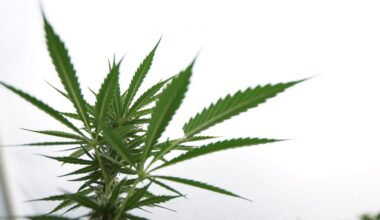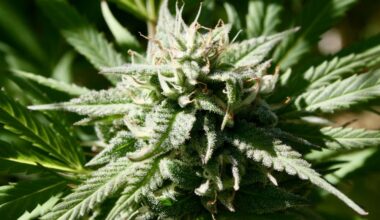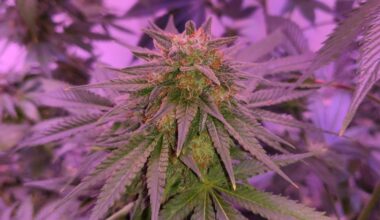Newly sworn in Colombian President Gustavo Petro is talking up the potential of legalizing marijuana, adding that it’s time to seriously think about releasing people who are currently incarcerated over cannabis—especially in light of reforms that have been enacted in U.S. states and Canada.
The president has made clear the ending the drug war will be an administrative priority, and he talked about what a legal marijuana industry in Colombia could look like at a summit of mayors on Wednesday.
He spoke about the economic potential of a legal cannabis industry, one where small towns in places like the Andes, Corinto and Miranda could stand to benefit from legal marijuana cultivation, possibly without any licensing requirements.
He also signaled that he’d be interested in exploring the idea of exporting cannabis to other countries where the plant is legal.
“What happens if cannabis is legalized in Colombia without licenses?” Petro, the country’s first left-wing president, said, according to a translation. “Like sowing corn, like sowing potatoes.”
Dijo @petrogustavo sobre legalización del cannabis en 🇨🇴:
Que sea legal, “como sembrar maíz, como sembrar papa”
Que se exporte y “así nos ganamos unos💵” porque “en media humanidad es legal”
Que se libere a campesinos criminalizados por esto¿Qué opinas?pic.twitter.com/ZECxE4j5oL
— Ángel González (@angelgonzalezvn) August 11, 2022
“We’ll see if [cannabis can be] exported and we’ll earn a few dollars because half of humanity [has legalized it],” he said, somewhat exaggerating the current international cannabis policy landscape.
Petro said that he’d want Colombia to become a competitive cannabis market, comparing it to Canada’s legal industry. He also referenced the U.S., where marijuana might remain federally prohibited but most states allow it in some form and have taken equity steps to stop locking people up over the plant.
“If we are going to legalize cannabis, are we going to keep all those people imprisoned in overcrowded prisons, or has the time come to release many people from prisons simply because they were criminalized for something that is legal in much of the United States,” he said.
A legalization bill championed by Colombian Sen. Gustavo Bolívar was introduced in July, and the senator said that the reform is within reach now that the country’s Congress has a liberal majority of lawmakers who fit within a political coalition known as the Historic Pact.
“We had already presented it in the last legislature [in 2020]. It managed to pass in the first commission, but they did not put it in plenary because precisely the boards tend to manipulate the entire agenda and they never scheduled it for the entire [session] so it sank,” Bolívar said, according to Publimetro.
#MeGustaLaIdea
¡Cannabis legal!
El 20 de julio presentó de nuevo el Proyecto de Ley q regula la Marihuana de uso adulto.
Con nuestras mayorías vamos a aprobarlo.
Dejaremos de matarnos por una planta q en USA produce 25.000 millones de dólares/año y mejora la salud del consumidor pic.twitter.com/A2RgUvnuQZ— Gustavo Bolívar (@GustavoBolivar) July 6, 2022
“But today, with that overwhelming majority, I hope that this alliance is programmatic and that all the parties that have joined the government coalition support it,” he said. “That was one of our initiatives that are campaign promises also from Gustavo Petro.”
As a side note, the CEO of a major U.S. marijuana company Flora met with Bolívar and other Colombian lawmakers before the latest legalization bill was filed to offer perspective the main components of the reform proposal.
Meanwhile, Petro also recently talked about his views on ending the broader war on drug in his inaugural address last week, emphasizing the need for the international community to unite around the idea that criminalization as a policy has failed.
He said that the status quo has fostered an environment of unregulated manufacturing and sales that has enriched and emboldened transnational drug cartels. Colombia has an intimate understanding of these problems as one of the chief exporters of illicit substances such as cocaine.
“For peace to be possible in Colombia, we need to dialogue, talk a lot, understand each other, look for common paths, produce changes,” Petro said in his swearing-in ceremony speech on this month.
“Of course, peace is possible if you change, for example, the politics against drugs, for example, seen as a war, for a policy of strong prevention of consumption in developed societies,” he said, suggesting a public health approach to drug use that echoes arguments from advocates and experts around the world.
“It is time for a new international convention that accepts that the drug war has failed, which has left a million murdered Latin Americans during these 40 years and that leaves 70,000 Americans dead from drug overdoses each year,” he said. “The war on drugs strengthened the mafias and weakened the states.”
“The war on drugs has led states to commit crimes and has evaporated the horizon of democracy. Are we going to expect that another million Latin Americans will be murdered and that the number of deaths from overdoses in the United States will rise to 200,000 every year? Or rather, will we exchange failure for a success that allows Colombia and Latin America to live in peace?”
U.S. Rep. Jim McGovern (D-MA), who chairs the powerful House Rules Committee, cheered the official swearing in of Petro, saying that he looks forward to “working together to…rethink drug policy, and much more.”
President Joe Biden, on the other hand, seems intent on perpetuating the drug war in Colombia, with U.S. military support. He released a memorandum to the defense secretary on Wednesday that authorizes the “interdiction of aircraft reasonably suspected to be primarily engaged in illicit drug trafficking in that country’s airspace.”
He said that it’s “necessary because of the extraordinary threat posed by illicit drug trafficking to the national security of that country” and because “Colombia has appropriate procedures in place to protect against innocent loss of life in the air and on the ground in connection with such interdiction, which includes effective means to identify and warn an aircraft before the use of force is directed against the aircraft.”
As a former member of Colombia’s M-19 guerrilla group, Petro has seen the violent conflict between guerrilla fighters, narcoparamilitary groups and drug cartels that has been exacerbated by the government’s aggressive approach to drug enforcement.
According to the United Nations Office of Drug Control Policy (ONDCP), Colombia remains a chief exporter of cocaine, despite “drug supply reduction activities in Colombia, such as eradication of coca bush and destruction of laboratories.”
In 2020, Colombian legislators introduced a bill that would have regulated coca, the plant that is processed to produce cocaine, in an acknowledgment that the government’s decades-long fight against the drug and its procedures have consistently failed. That legislation cleared a committee, but it was ultimately shelved by the overall conservative legislature.
Advocates are optimistic that such a proposal could advance under a Petro administration. The president hasn’t taken a clear stance on the legislation itself, but he campaigned on legalizing marijuana and promoted the idea of cannabis as an alternative to cocaine.
Former Colombia President Juan Manuel Santos has also been critical of the drug war and embraced reform. In an editorial published before he left office, he criticized the United Nations and U.S. President Richard Nixon for their role in setting a drug war standard that has proved ineffective at best and counterproductive at worst.
“It is time we talk about responsible government regulation, look for ways to cut off the drug mafias’ air supply, and tackle the problems of drug use with greater resources for prevention, care and harm reduction with regard to public health and the social fabric,” he said.
“This reflection must be global in scope in order to be effective,” Santos, who is a member of the pro-reform Global Commission on Drug Policy, said. “It must also be broad, including participation not only of governments but also of academia and civil society. It must reach beyond law enforcement and judicial authorities and involve experts in public health, economists and educators, among other disciplines.”
Michigan Breaks Monthly Marijuana Sales Record In July, State Data Shows
Image element courtesy of Bryan Pocius.
Medical Disclaimer:
The information provided in these blog posts is intended for general informational and educational purposes only. It is not a substitute for professional medical advice, diagnosis, or treatment. Always seek the advice of your physician or other qualified healthcare provider with any questions you may have regarding a medical condition. The use of any information provided in these blog posts is solely at your own risk. The authors and the website do not recommend or endorse any specific products, treatments, or procedures mentioned. Reliance on any information in these blog posts is solely at your own discretion.







